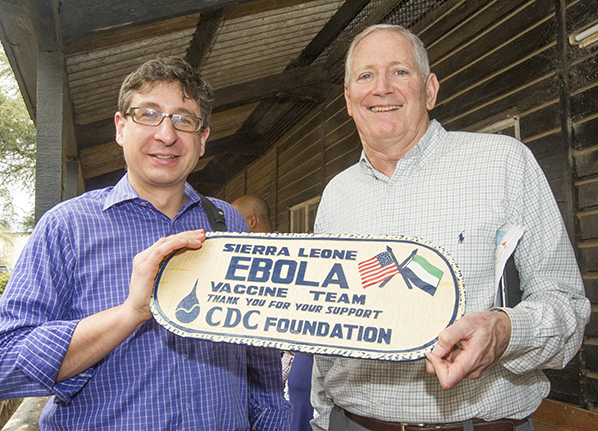You are here
Sierra Leone Vaccine Trial Highlights Public-Private Partnership Value

At the CDC Foundation, we often describe our work with CDC as helping the agency do more and faster than it might be able to do using government resources alone. In the 20 years I have led the CDC Foundation, there are many instances of how we’ve provided donor support to CDC, from infectious diseases to chronic conditions to emergency response activities. However, from my point of view, the response to the Ebola epidemic in West Africa provides one of the most poignant illustrations of how the private sector can help CDC rapidly extend its life-saving work.
A prime example from the response is the CDC Foundation’s efforts with the vaccine trial CDC is leading with its partners in Sierra Leone. The vaccine trial, which just began enrolling and vaccinating volunteers, is known as the Sierra Leone Trial to Introduce a Vaccine against Ebola (STRIVE). CDC is conducting STRIVE with the Sierra Leone College of Medicine and Allied Health Sciences and the country’s Ministry of Health and Sanitation. The trial is assessing a candidate Ebola vaccine among 6,000 healthcare providers and other frontline workers.
Late last year, CDC senior staff approached the CDC Foundation about the possibility of securing donor support for an Ebola vaccine trial in Sierra Leone. They explained that CDC would need substantial U.S. government funding to conduct the trial, however funding was not available for several months. In anticipation of a funding lag, CDC asked if the CDC Foundation would consider applying Ebola response donor funds to launch preliminary work on the vaccine trial until government funds were available. Waiting to begin this preliminary work could delay the trial or prevent it from happening.
“Many of the preparations for a clinical trial take considerable time, and the availability of early CDC Foundation funds allowed us to start many activities to lay the groundwork, such as communications and trial infrastructure building, which otherwise would have never been ready in time for the trial to start,” according to Dr. Marc-Alain Widdowson, co-principal investigator for STRIVE.
At the CDC Foundation, we considered the request and quickly decided to provide up to $2.5 million utilizing the $25 million flexible funding grant provided by Facebook Founder and CEO Mark Zuckerberg and his wife Dr. Priscilla Chan through their donor-advised fund at Silicon Valley Community Foundation. To date, the CDC Foundation has committed or spent more than $1.3 million in donor-provided funds to start work on the trial.

Since committing support to get the trial underway, the CDC Foundation has provided funding for many purposes, including infrastructure improvements, staffing, communications, technology and equipment. For instance, computers, laptops, tablets and printers were needed to conduct the trial, and many of the buildings where the trial would take place needed significant upgrades. The CDC Foundation met both of these needs.
Also, the stability of the vaccine requires storage at a very low temperature. The CDC Foundation provided funding for special transportation and storage capable of maintaining the cold temperature and included back-up power supplies to deal with common electricity outages. In addition, the CDC Foundation supported focus groups to help craft culturally sensitive vaccine messaging to health workers—for instance helping to address misperceptions such as a belief that the Ebola vaccine transmits the disease. The Foundation also used donor support for planning conferences and workshops to train and prepare healthcare staff conducting the trial.
“In a trial such as this implemented under tremendous time pressure and during an emergency response, unexpected and urgent needs can emerge rapidly and need to be addressed immediately,” said Widdowson. “The CDC Foundation provided flexibility to do this. It is fair to say that without that flexibility, timely launch of this trial would have been impossible.”
Today, U.S. government appropriations are available to provide most of the funding for the trial, and we at the CDC Foundation are pleased that we were able to play a role in this important work.
We greatly appreciate our private-sector donors’ generous—and essential—support in advancing CDC’s Ebola response. And we are grateful to our CDC colleagues who continue working with their public health partners in Sierra Leone to make STRIVE a reality. It is our hope that the Ebola vaccine will become an effective prevention tool that will help save many lives.